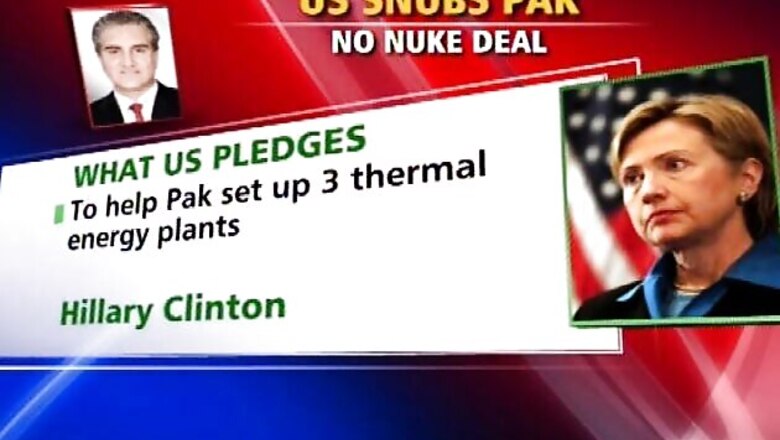
views
Washington Pakistan appeared to have found little encouragement from the US as it raised two of its pet peeves - an India-type civil nuclear deal and mediation on Kashmir - at their first strategic dialogue here.
The very first question that US Secretary of State Hillary Clinton fielded at the end of the first round of meetings Wednesday with Pakistan Foreign Minister Shah Mehmood Qureshi was whether Washington was prepared to discuss an India-type nuclear deal with Pakistan.
Her answer couched in diplomatese made it fairly clear that while Washington was willing to listen to everything on Pakistan's long wish list presented in a 56-page memorandum ahead of the talks, progress on such "complicated issues" could be expected only over time.
"We have a broad agenda with many complicated issues like the one you referred to," Clinton said without using the "nuclear" word. "... we've said that we will listen to and engage with our Pakistani partners on whatever issues the delegation raises."
"We don't just make announcements and then forget about them and get the headlines and move on," she said. "So this dialogue that we're engaged in is helping us build the kind of partnership that can make progress over time on the most complicated of issues."
US "was committed to helping Pakistan meet its real energy needs" and was "particularly pleased that we are moving forward with $125 million to Pakistan for energy sector projects," Clinton said.
Similarly when asked why "Americans seem too reluctant to play their real role" on issues related to Taliban, terrorism and India, she reiterated that while Washington encouraged a dialogue between India and Pakistan, it was for them to resolve any issues bilaterally.
"Well, I think it's important to recognize that the United States has positive relationships with both Pakistan and India. And we certainly encourage the dialogue between India and Pakistan," Clinton said.
"The issues that are part of that dialogue need to be addressed, and resolution of them between the two countries would certainly be in everyone' s best interest,' she said.
"But I want to just underscore that our goal in the Obama Administration is to make clear that we are going to be a partner with Pakistan going forward on a full range of matters."
"Now, we can't dictate Pakistani foreign policy or Indian foreign policy. But we can encourage, as we do, the in-depth discussion between both countries that we think would benefit each of them with respect to security and development," Clinton said.
But Qureshi was quick to add that while Islamabad respected US-India bilateral relations, all that it was insisting on was that those relations should not be at the cost of Pakistan. He also suggested that India would have to "revisit its policy" very soon.
"As far as India is concerned, they are a sovereign country and they have bilateral relations and we respect that. But all we are saying that those relations should not be at the cost of Pakistan," he said.
"And we are very clear and I think you are very clear on that. I'm of the view that Pakistan has been willing to engage," Qureshi said. "And I'm confident, as two years down the line, I'm confident of this relationship. I'm confident that India will have to revisit its policy and very soon."
Earlier as the talks began Wednesday morning Qureshi again made a public plea to the US to "constructively engage" in the process of peaceful resolution of the Kashmir issue with India and sought "non-discriminatory access to vital energy resources," an apparent reference to an India-type nuclear deal.



















Comments
0 comment